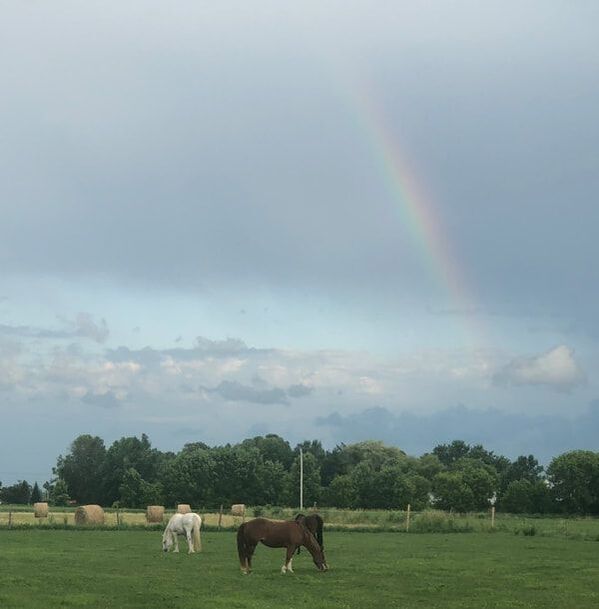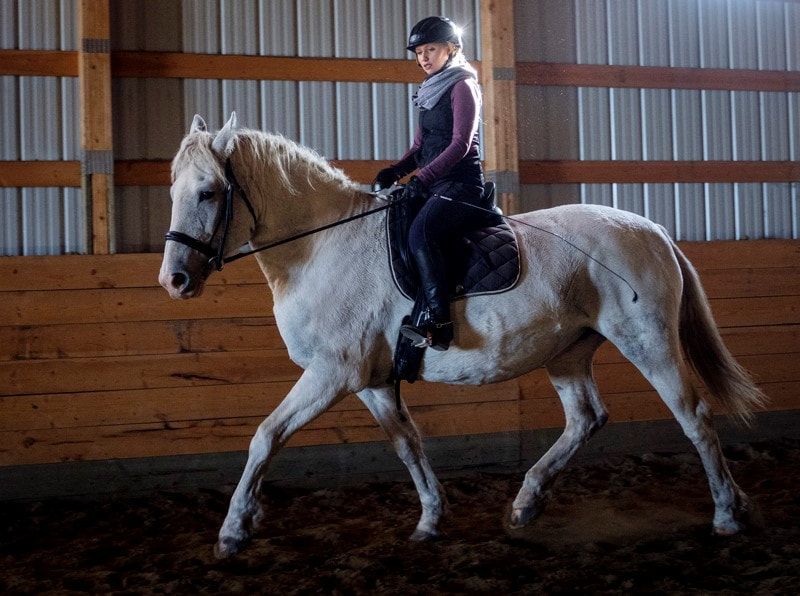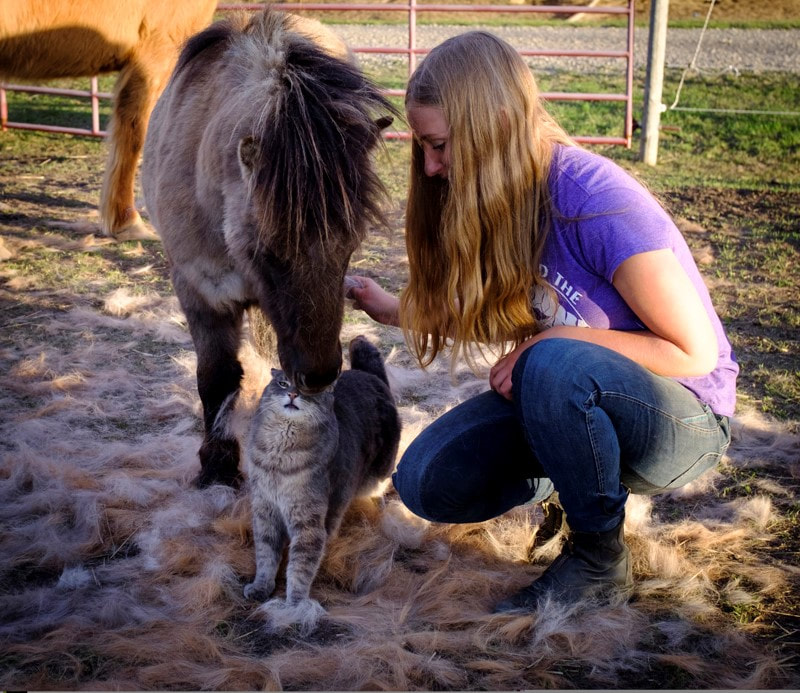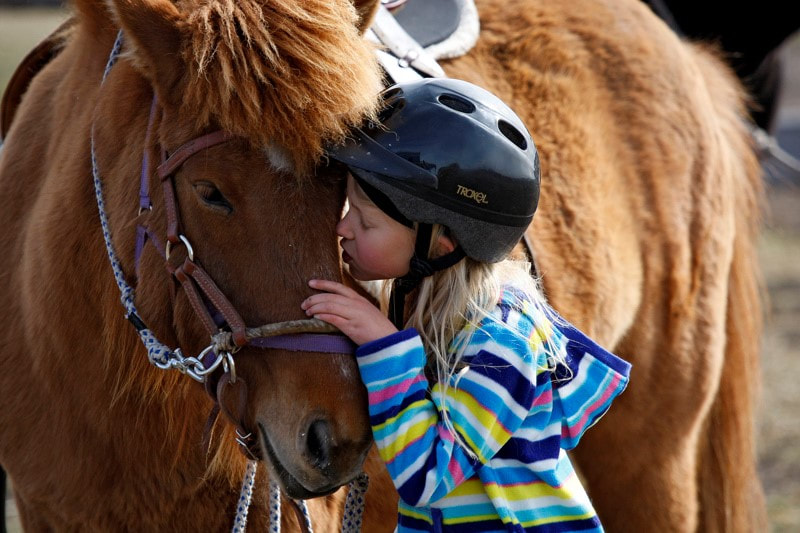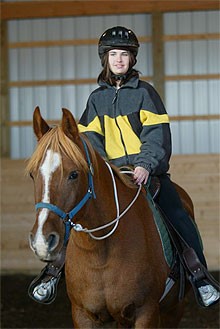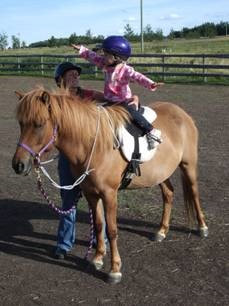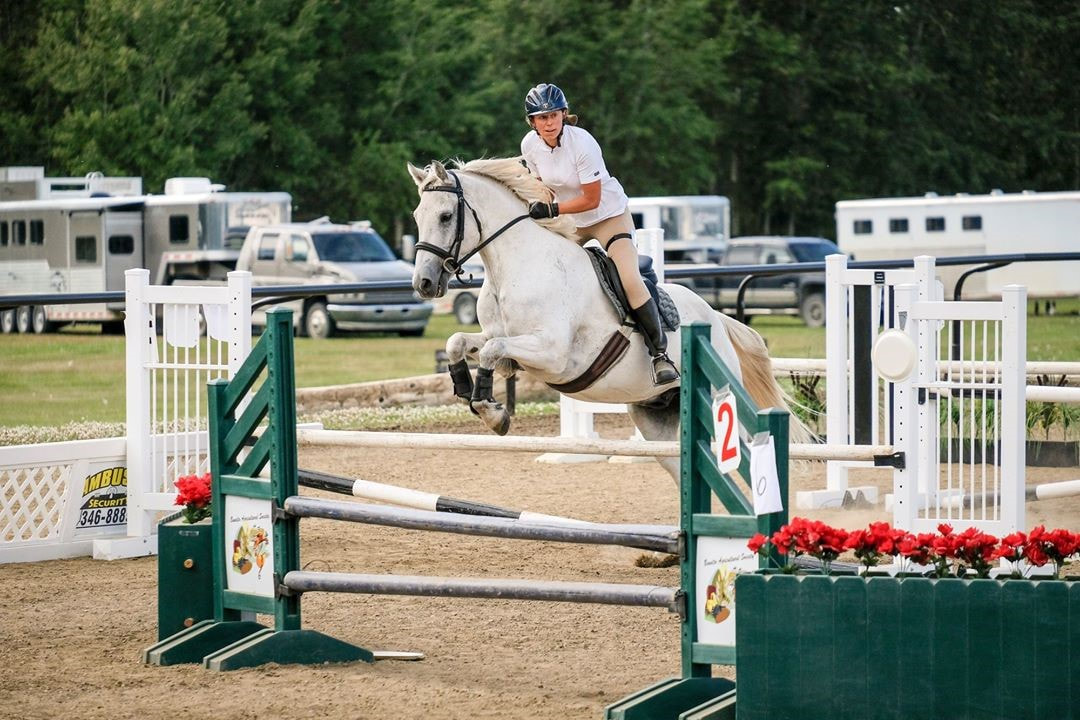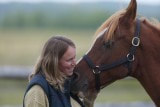IN THIS ISSUE : |
DO CLIENTS ALWAYS RIDE HORSES IN EQUINE THERAPY?
BY SUE MCINTOSH
THE QUICK ANSWER
Riding is not always a part Equine Therapy and is rarely the primary focus. However, provided a certified equine professional is a part of the team, and you have safe horse to work with, within a safe environment conducive to riding, it can be incorporated for some clients.
THE LONGER ANSWER
There are EFW (Equine Facilitated Wellness) programs that do not have any riding component, others that incorporate a little riding and some that have a larger focus on riding. As we have noted in many of our earlier posts in this series there is lots of flexibility in this field.
There is certainly much that can be done in an EFW session without a client ever getting on a horse. This may include observing horses in the pasture, grooming horses, relaxation exercise with the horses, sharing stories with and about the horses, leading horses, and practicing groundwork exercises.
Simply ‘being with’ a horse in the present moment is often the most powerful and healing aspect of our work … and the greatest gift we can offer a client.
Rushing too quickly into encouraging or allowing a client to ride could get in the way of these healing opportunities.
There is certainly much that can be done in an EFW session without a client ever getting on a horse. This may include observing horses in the pasture, grooming horses, relaxation exercise with the horses, sharing stories with and about the horses, leading horses, and practicing groundwork exercises.
Simply ‘being with’ a horse in the present moment is often the most powerful and healing aspect of our work … and the greatest gift we can offer a client.
Rushing too quickly into encouraging or allowing a client to ride could get in the way of these healing opportunities.
When EFW programs do incorporate riding the primary focus is not usually on learning riding skills. While basic skills should be taught for safety reasons, the riding component of an EFW session is usually one strategy utilised towards achieving the EFW goals for that client, rather than being the goal itself.
For more information on some of the benefits of NOT riding within an EFW program, there is a great article in a past newsletter from EFW Canada.
Sometimes whether your clients ride depends on your certification choice. For example, EAGALA does not allow any of their practitioners to include a riding component while a CanTRA or PATH program is likely to include quite a bit of ridden work.
The decision whether or not to have clients ride may also depend on your client population. For example, children are often very keen to ride your horses, while this aspect of the work may be less important for adult clients.
The ‘to ride or not to ride’ decision will also depend on your equine credentials, education and experience, particularly regarding your ability to keep novice and nervous riders safe. EFW Canada require a certified Equine Professional (EP), with experience specifically with novice riders, to be present whenever clients get on a horse. At Healing Hooves we add an extra training component covering riding considerations for those participants who are pursuing EP certification and plan to invite some of their clients to ride. EFW Canada currently have a committee looking into further defining the training requirements in this area.
At Healing Hooves less than half of our clients get on horses and nobody goes out of a walk. But some clients do ride. When a client would like to ride and we agree that it would be both safe and in the client’s interests to do this, we follow a process which includes the following steps:
The main focus remains upon the relationship between the client and horse rather than on teaching riding skills beyond the basic required for safety and comfort (for client and horse). Before a client ever gets on a horse we focus on developing this relationship, meaning a client may not ride until the fourth or fifth session. This can provide some great metaphors for human relationships.
For more information on some of the benefits of NOT riding within an EFW program, there is a great article in a past newsletter from EFW Canada.
Sometimes whether your clients ride depends on your certification choice. For example, EAGALA does not allow any of their practitioners to include a riding component while a CanTRA or PATH program is likely to include quite a bit of ridden work.
The decision whether or not to have clients ride may also depend on your client population. For example, children are often very keen to ride your horses, while this aspect of the work may be less important for adult clients.
The ‘to ride or not to ride’ decision will also depend on your equine credentials, education and experience, particularly regarding your ability to keep novice and nervous riders safe. EFW Canada require a certified Equine Professional (EP), with experience specifically with novice riders, to be present whenever clients get on a horse. At Healing Hooves we add an extra training component covering riding considerations for those participants who are pursuing EP certification and plan to invite some of their clients to ride. EFW Canada currently have a committee looking into further defining the training requirements in this area.
At Healing Hooves less than half of our clients get on horses and nobody goes out of a walk. But some clients do ride. When a client would like to ride and we agree that it would be both safe and in the client’s interests to do this, we follow a process which includes the following steps:
The main focus remains upon the relationship between the client and horse rather than on teaching riding skills beyond the basic required for safety and comfort (for client and horse). Before a client ever gets on a horse we focus on developing this relationship, meaning a client may not ride until the fourth or fifth session. This can provide some great metaphors for human relationships.
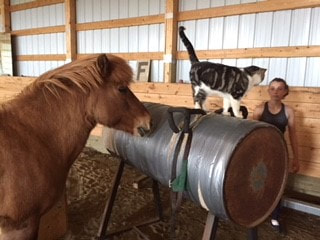
We discuss, explore and practice relaxation, breathing and balance before getting on a horse. Before the client sits on a horse they practice mounting, dismounting and finding a balanced position on a specially designed barrel. We practice the ‘emergency dismount’ (on the barrel first and then from a horse) so that we know a client could safely and quickly get off a horse and move to safety if this was needed. Again this process can provide for transfers to discussions about human relationships and situations with many clients.
Clients ride in an enclosed riding arena and unless they have significant prior riding experience we will not use a bit in the horses’ mouth. We use either halters, or if we feel we require a little more control we use Lindels (side pulls) which do not have a bit. In early sessions, and perhaps for all with some clients, we will lead the horse.
Clients ride in an enclosed riding arena and unless they have significant prior riding experience we will not use a bit in the horses’ mouth. We use either halters, or if we feel we require a little more control we use Lindels (side pulls) which do not have a bit. In early sessions, and perhaps for all with some clients, we will lead the horse.
- Clients wear approved riding helmets and ride in saddles with safety (peacock) stirrups.
- Clients only ride horses who have lots of training and experience with novice and nervous riders. We take a lot of time to get our horses ready for this type of work. We also make sure that these horses also get lots of riding time time with experienced riders.
- Once the client is on a horse the focus is still upon the relationship. But riding can open up new possibilities for body awareness, relaxation and learning new skills. It is also a lot of fun!
- If a client wants to learn more advanced riding skills we will refer them to a suitable riding program.
IF YOU FOUND THIS ARTICLE HELPFUL, PLEASE SHARE IT!
|
Sue McIntosh is the founder of Healing Hooves in Cremona, Alberta. She offers services in Equine and Animal Assisted Therapy, counselling, parent support, professional training and resources in Equine Facilitated Wellness (EFW), child development and attachment, to adults, children families and professionals since 1999. We are proud to have her as a tri-certified EFW-Can trainer, mentor and practitioner
|
|
We invite you to take a look at the virtual conference “The Power of Partnering with Horses for Healing”. Two of our EFW-CAN trainers, Sue McIntosh and Sandra Wallin, and one of our certification candidate, Sarah Schlote, are among the guest speakers. The conference, which was held July 8-10, 2019, was put together by Michelle Holling Brooks. You can access the conference information by clicking here.
|

